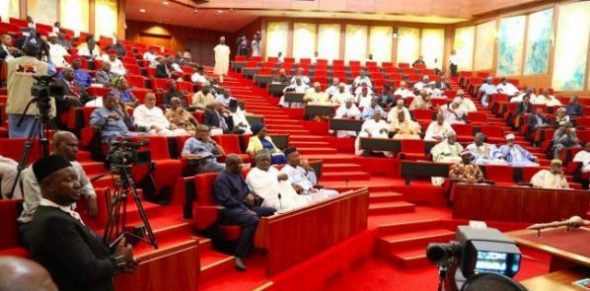Politics
Only three women to join 10th Senate, despite calls for increased female participation in politics

Only three female senators-elect were on the list of successful names published by the Independent National Electoral Commission (INEC) as the incoming legislators of the 10th Senate following the National Assembly elections held on the February 25.
The three senators-elect are Labour Party’s Kingibe Ireti Heebah, representing the Federal Capital Territory; Peoples Democratic Party’s Banigo Ipalibo Harry, representing Rivers West, and Adebule Idiat Oluranti of the All Progressives Congress representing Lagos West, although she was indicated as male on the INEC list.
Except more females emerge from the bye-elections scheduled for about six more seats by INEC, only these two women will sit in the red chamber in the incoming 10th Senate.
This development is against the clamours for increased participation as well as appointments for women in politics.
Pre-election discussions were in part reflective of the need for gender balance in politics, as several presidential candidates harped on women inclusion and political participation.
The Labour Party presidential candidate, Peter Obi, at the Voice of Women (VOW) 2022 conference and awards, held in Abuja, particularly decried the palpable exclusion of women from politics and its attendant implications for the country.
Obi, who said the country was collapsing and woman could not be ignored, noted: “If anyone says to you that they want to rule this country, let them show you their past record on women’s representation and competency.”
Read also:10th Senate: APC leads with 55 Senators-Elect as INEC publishes list
The former Anambra State governor argued that for the country to move forward, women must be engaged in governance and decision-making as antecedents had shown that they can manage finances better.
The Minister of Women Affairs, Pauline Tallen, had similarly identified the low number of women in politics and other leadership positions as a major setback to the country’s development.
The Minister, who stated this at a news conference in Abuja last year, harped on the status of women inclusion, participation in governance, both at the state and subnational levels.
She stated that inadequate number of women in decision-making positions explained the country’s low investment and slow progress in some of the crucial sectors of human development outcomes.
“For instance, currently in the House of Representatives, out of 360 members, only 18 are women, representing about 4.61 per cent; Senate has eight women out of 109 members, representing 7.34 per cent.
“The same trend, even worse, runs down all levels of governance in the states and local government areas. Available data from 12 out of 36 states are a clear demonstration of the injustice perpetuated in the election and appointment of women.
“It is evident that women have been short changed. Out of 36 states of the federation there are no female governors, only two female deputy governors”, Tallen noted.
Join the conversation
Support Ripples Nigeria, hold up solutions journalism
Balanced, fearless journalism driven by data comes at huge financial costs.
As a media platform, we hold leadership accountable and will not trade the right to press freedom and free speech for a piece of cake.
If you like what we do, and are ready to uphold solutions journalism, kindly donate to the Ripples Nigeria cause.
Your support would help to ensure that citizens and institutions continue to have free access to credible and reliable information for societal development.




















